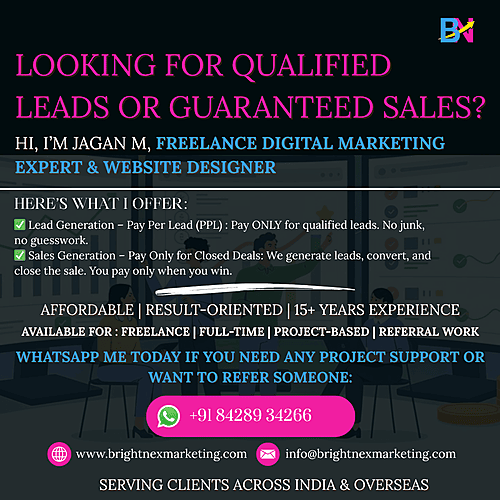Introduction
In today’s competitive digital landscape, sales and lead generation have become more complex than ever—especially for small businesses with limited resources. Traditional methods are not only time-consuming but often inefficient. Fortunately, the rise of artificial intelligence (AI) is changing the game. AI is helping small businesses identify, attract, and convert leads with greater precision and speed, offering a smarter and more scalable approach to growth.
Why AI Matters in Sales and Lead Generation
Artificial Intelligence is no longer just a buzzword—it’s a powerful tool that small businesses can use to streamline operations, enhance targeting, and drive conversions. From chatbots that handle customer inquiries to predictive analytics that identify high-quality leads, AI is making sales and lead generation more efficient and effective.
1. AI-Powered Customer Insights
Understanding customer behavior is at the heart of effective lead generation. AI tools can analyze massive datasets to extract actionable insights about customer preferences, behaviors, and pain points. These insights allow small businesses to:
Build accurate customer personas
Segment audiences based on real-time data
Predict future buying behavior
With these capabilities, businesses can create targeted campaigns that speak directly to their ideal customers, increasing engagement and sales.
2. Personalized Marketing at Scale
Personalization used to be a luxury reserved for large corporations, but AI has democratized this capability. AI tools can automatically personalize email campaigns, website content, and product recommendations based on user data. In the context of sales and lead generation, this means:
Higher click-through and conversion rates
Improved customer retention
More effective nurture sequences
By delivering the right message at the right time, AI ensures that your prospects feel valued and understood.
3. Automation of Repetitive Tasks
One of AI's biggest advantages is the ability to automate time-consuming tasks. From sending follow-up emails to qualifying leads through scoring systems, AI removes the manual work that slows down sales teams. This enables small business owners to focus on high-impact activities like closing deals and strategic planning.
Examples of AI-powered automation tools include:
CRM platforms with smart task scheduling
Chatbots for lead qualification
Workflow automations for follow-ups
The result? Faster response times and more streamlined sales and lead generation pipelines.
4. Predictive Lead Scoring
Not all leads are created equal. AI uses machine learning algorithms to assess a lead’s likelihood to convert based on past behavior, engagement level, and demographic data. This process—called predictive lead scoring—allows sales teams to:
Prioritize high-value prospects
Avoid wasting time on unqualified leads
Improve overall conversion rates
This makes your sales and lead generation strategy more strategic and results-driven.
5. Enhancing Social Media and Ad Targeting
AI plays a crucial role in optimizing paid advertising and social media strategies. Platforms like Facebook, Google, and LinkedIn already use AI to serve the most relevant ads to users. Small businesses can leverage these algorithms to:
Identify the best-performing creatives
Optimize ad spending
Retarget visitors with precision
With AI in play, your sales and lead generation campaigns become more cost-effective and targeted.
6. Real-Time Performance Tracking and Optimization
AI-powered dashboards and analytics tools provide real-time insights into campaign performance. This allows businesses to quickly identify what’s working—and what’s not—and adjust accordingly. Metrics like:
Cost-per-lead (CPL)
Lead-to-sale ratio
Engagement rates
...can all be monitored and optimized for better results.
7. AI Chatbots: The 24/7 Sales Assistant
AI chatbots offer a consistent and immediate way to engage with potential leads—anytime, anywhere. These bots can:
Answer product/service questions
Collect user information
Schedule appointments or demos
For small businesses, this kind of availability can significantly boost sales and lead generation without requiring additional manpower.
Challenges and Considerations
While AI offers numerous benefits, it’s important to acknowledge potential challenges:
Initial setup and learning curve
Data privacy concerns
Risk of over-automation leading to impersonal customer interactions
Small businesses should start with simple AI tools and gradually scale their usage to avoid overwhelm.
Conclusion: The Future of Sales and Lead Generation Is AI-Driven
AI is no longer optional for small businesses looking to grow. It’s a necessity for those who want to stay competitive in the evolving digital economy. By leveraging AI for data analysis, personalization, automation, and real-time optimization, small businesses can transform their sales and lead generation strategy into a lean, efficient, and highly effective system.
As the technology continues to evolve, those who adapt early will have a strong competitive edge—resulting in more leads, more sales, and ultimately, long-term business success.


